Updated December 2023.
As a marketer or SEO expert, you definitely want to accomplish more tasks in less time.
Whether it’s fetching all the metadata from a domain within minutes or identifying all the crawling issues of a website without manually reviewing each and every URL, tools have always been the savior for savvy marketers. SEO tools help you to complete a set of tasks as fast as possible and with as close to perfection as you can get.
In this post, I will present a list of awesome paid, freemium (meaning that you need to pay only if you wish to use extra features) and free SEO tools to improve your Google ranking.
Here are 31 top SEO tools that will improve your ranking, categorized by free or paid (with freemium options).
Their expertise has helped Nextiva grow its brand and overall business
Paid SEO Tools
1) Ahrefs (Paid)
Ahrefs is a leading SEO suite that offers a collection of SEO tools to boost any domain. It is trusted by leading brands worldwide such as Adobe, Uber and Netflix.
How to Use This Tool
To use Ahrefs, you need to buy a premium subscription, which runs from $99 – $99 per year.
Once logged in, enter your website address in Site Explorer to get an in-depth analysis of your site with metrics like organic traffic, backlink profile, top-ranking keywords, and traffic value.

Besides keyword research and competitor analysis, you can also use Ahrefs to find critical SEO issues on your site. Ahrefs’s Site Audit feature scans your website for 100+ SEO issues and provides recommendations to fix them:

Top Features:
- Site Explorer – Get every essential data of any domain, including domain rating, total backlinks, total referring domains, organic keywords, total traffic and traffic value.
- Site Audit – Optimize your on-page SEO, as it checks your website for around 120 technical SEO issues like HTTP errors, content quality, outgoing links, and image alt tags.
- Keyword Research – Access Ahrefs’ enormous keyword database to find thousands of keyword ideas with data-driven metrics like search volume, keyword difficulty, SERP overview and CPC.
- Content Explorer – Find top-performing content in your industry.
- Rank Tracker – Check keyword ranking across 170 countries with average position and traffic.
Why It’s Useful
No matter whether you need to perform keyword research, build backlinks, or tackle technical SEO, Ahrefs all-in-one toolkit makes it easy to manage all of your SEO efforts in one comprehensive yet easy-to-use dashboard. Ahrefs is a very useful tool because it comes with a complete SEO toolkit.
2) Ubersuggest (Freemium)
Ubersuggest is a beginner-friendly SEO tool founded by Neil Patel which takes the hard work out of analyzing domains, researching keywords, to analyze a domain, research keywords, reverse-engineer competitors, uncover backlink data, and perform other essential SEO tasks.
How to Use This Tool
Log in to the tool and enter any domain or keyword to get data. You can select your preferred target location from the available options.

This tool returns the number of organic keywords on which the domain ranks, the monthly organic traffic, the domain authority, and total backlinks. It also shows keyword research volume, SEO difficulty, and Cost Per Click.

Top Features:
- Keyword Ideas – Generate lots of low-competition keywords for your website.
- Keyword Analysis – Analyze your competitors’ keywords.
- Content Ideas – Find dozens of winning content topic ideas along with suggested keywords.
- Site Audit – Find all the critical SEO errors on your sites like 404, broken internal links, and duplicate content.
- Backlink Opportunity Find hundreds of link building opportunities on websites that link to your competitor’s domain but not yours.
Why It’s Useful
Ideal for small businesses and personal websites, Ubersuggest’s biggest selling point is its super-simple, beginner-friendly interface, making it a great option for SEO newbies.
Dive Deeper: How Zero Search Volume Keywords Can Generate a Ton of Traffic
3) KeywordChef (Freemium)
KeywordChef is a keyword research tool that helps you find tons of relevant long-tail keywords with clear search intent, making it easier to come up with ideas for high-ranking content.
How to Use This Tool
Register for the site and log in to the tool. Then enter your seed keyword and select the type of keyword research you wish to perform.

There are several types of keyword research to choose from:
- Wildcard searches
- Question keyword searches
- Keywords starting with “best”
- Comparison keywords
- Keywords starting with “How to”
- Keywords starting with “Most”
- Alternative keyword suggestions
- Keywords containing “ideas”
Now click on the search icon and the tool will share some sample keywords from the search. You have to spend some credits to view the complete search results:

The tool gives you 1,000 credits for free, and after you’ve used them, you can buy more credits for as little as $20.
Top Features:
- High-Quality Keywords – Find quality keywords that are easy to rank for along with the search volume.
- Wildcard Search – Automatically find relevant keyword opportunities related to your seed keyword. For example, you can add “*” with keywords for a wildcard search like “best for frozen” or “can you cook in the oven” and KeywordChef will show you relevant search terms with “best” or “can you cook” terms.
- SERP Analysis – Find forms and other user-generated content that you can easily rank for.
Why It’s Useful
Every SEO wants to find keywords that are easy to rank for and KeywordChef helps to identify keyword opportunities where you can rank fast. Moreover, the credit-based system means you only ever pay for what you need, when you need it, avoiding the need to pay a recurring monthly fee.
Dive Deeper: Why You Should Use Long-Tail Keywords in Your SEO Campaign
4) Link Whisper (Paid)
Link Whisper is a useful WordPress SEO plugin designed to speed up the internal linking process in order to rank better in the SERPs. The tool is easy to install and comes with powerful features.
How to Use This Tool
After you installing the plugin, Link Whisper automatically generates internal linking suggestions as you write your article. The suggestions you get are powered by artificial intelligence and are based on your existing blog posts as well as the relevancy of the article that you are editing.
For example, if you are writing content on “best SEO tools,” then Link Whisper will provide link suggestions for various anchor texts that are similar to the topic.
Link Whisper also helps you find pages with fewer or no internal links so that you can add internal links to these pages to boost search traffic. By using its Auto-Linking feature, you can build internal links on your choice of keywords. It is the best part of this tool as it helps you optimize your internal links according to your target anchors.
With its powerful internal linking report, you can quickly identify the number of internal links, orphaned posts, and 404 errors in your content and help you fix them:

Top Features:
- Link Suggestions – Generate a list of relevant internal links related to your target keyword.
- Metrics and Analysis – Import valuable SEO data from Google Search Console including impressions, clicks, average position and CTR (Click-Through Rate).
- Multi-Site Linking – Own multiple sites in a similar niche? Link Whisper can recommend internal linking opportunities between sites.
- Link Errors – Identify orphaned pages, broken links, and 404 errors.
Why It’s Useful
Internal links are crucial because they help Google understand your content and rank your site better in search results. Hence, if you want to improve your site’s internal linking structure, then Link Whisper is a must-have tool.
5) Moz Pro (Paid)
Giving the likes of Semrush and Ahrefs a good run for their money, Moz Pro is a comprehensive all-in-one SEO toolkit that does a solid job of tracking keyword and traffic data from both your own site and those of your competitors.
How to Use This Tool
Sign up for a free 30-day trial of Moz Pro. If you decide to keep it, plans run from $99 to $599 per month.
From there, enter your URL, then tell Moz Pro how many pages you want it to crawl, which keywords you want to track, and any competitors you want to monitor.

Once you’re set up, you can access the user-friendly dashboard to tackle practically on-page, off-page, or technical SEO auditing task you can think of, and get a comprehensive overview of important metrics like the number of referring domains linking to your website, Domain Authority (DA) and more.

Top Features:
- Keyword Research Tool – Get in-depth data about the monthly search volume, ranking difficulty and click-through rate of any keyword, along with useful keyword suggestions.
- SERP Analysis – Check out the top-ranking search results for your chosen keyword so that you can analyze their content before planning your own.
- Competitive Research – Gain a competitive advantage by identifying keyword gaps and backlink opportunities, as well as exploring the top-performing content in your niche.
Why It’s Useful
Moz Pro offers a seamless user experience, with very clear navigation and an attractive visual style that makes it a breeze to take both at-a-glance and in-depth looks at your SEO metrics. If you’re looking for an alternative to other all-in-one platforms, this one is definitely worth a look.
6) SpyFu (Paid)
While many of the tools in this guide offer competitive research features, SpyFu is one of the few that focuses almost exclusively on this valuable SEO strategy.
How to Use This Tool
Create a SpyFu account. Prices range from $9 – $79 per month.
Once you’re set up, enter any domain name and get a detailed overview containing keyword, traffic, and PPC data from the past month.
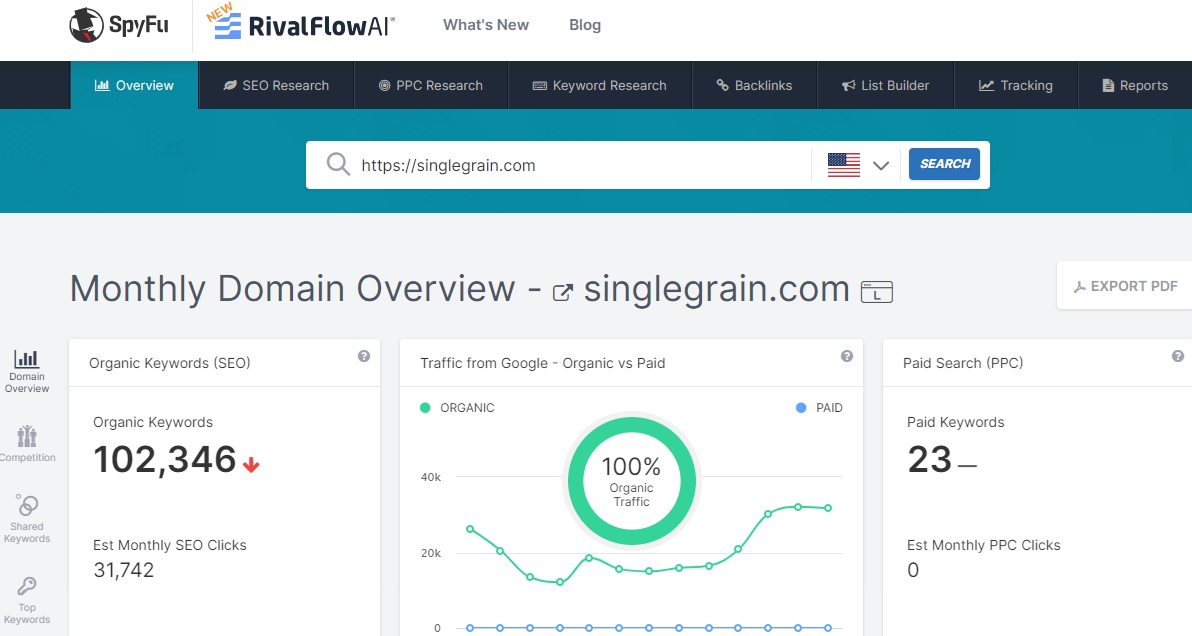
SpyFu will also show your top competitors, and you can dive into any one of them to analyze their seo metrics, targeted keywords, and more.
Top Features:
- Competitor Timelines – Compare your keyword rankings, monthly CTR rate and monthly value against your competitors on a handy timeline that even shows you how each site was affected by Google’s algorithm updates.
- Content Recommendations – Use AI to compare your content against higher-ranking pages to find the missing components and information you need to improve your ranking.
- PPC Research – Look at the most successful paid keywords and Google Ads history for any competitor to discover opportunities for optimizing your PPC strategy.
Why It’s Useful
If competitor analysis is your main priority right now, you don’t need all the other extras that come with full SEO toolkits. Using SpyFu ensures that you’re only paying for what you need and get straight to work without navigating through other necessary tools.
7) Majestic (Paid)
Majestic is a link intelligence tool that helps you manage your backlink profile and find new opportunities to improve it.
How to Use This Tool
Register for a Magistic account, enter your URL, and get a whole wealth of data on your inbound and outbound links that can be useful for improving the quality of your backlink profile.

Top Features:
- Referring Domains Breakdown – See useful metrics about the links pointing to your website, including the number of dofollow vs. nofollow links.
- Anchor Text Analysis – Take a detailed look at the anchor texts used to link to your website so that you can make informed decisions when optimizing your backlink strategy.
- Trust Flow – See how close you are to the most trusted websites in your niche.
Why It’s Useful
Few, if any tools, provide more data about the quality and quantity of your inbound links. If your focus is on link building right now, Majestic will prove to be a crucial addition to your arsenal.
8) Yoast SEO (Freemium)
Yoast is a robust SEO plugin for WordPress designed to help you create high-quality, high-ranking content.
How to Use This Tool
When creating new content, enter a focus keyword into Yoast.

You’ll then be provided with a list of important components you need to include to get your content ranking.

A red dot next to a particular SEO factor means you haven’t yet included it. An amber one means it could be improved, and a green dot means that factor is fully optimized.
Top Features:
- Real-Time SEO Score – Get feedback on the SEO quality of your posts as you create them so that you always know if you’re heading in the right direction.
- Schema Markup – Add structured data to your content to improve its indexability.
- Social Media – Customize how your posts look on Facebook, Instagram, LinkedIn, and other social media apps.
Why It’s Useful
Yoast’s free SEO tool does a good job of optimizing your content, but it’s the premium plan ($99 per year) that really proves most useful, giving you more features such as as-you-write internal linking suggestions and the ability to optimize your titles and meta descriptions with AI.
9) Serpstat (Freemium)
Serpstat is an affordable SEO toolkit combining keyword insights, competitor analysis, and technical site audit features into one easy-to-use package.
How to Use This Tool
Simply create an account and enter your domain name to access a wealth of statistics about your domain and search traffic, as well as that of other sites competing in your space.
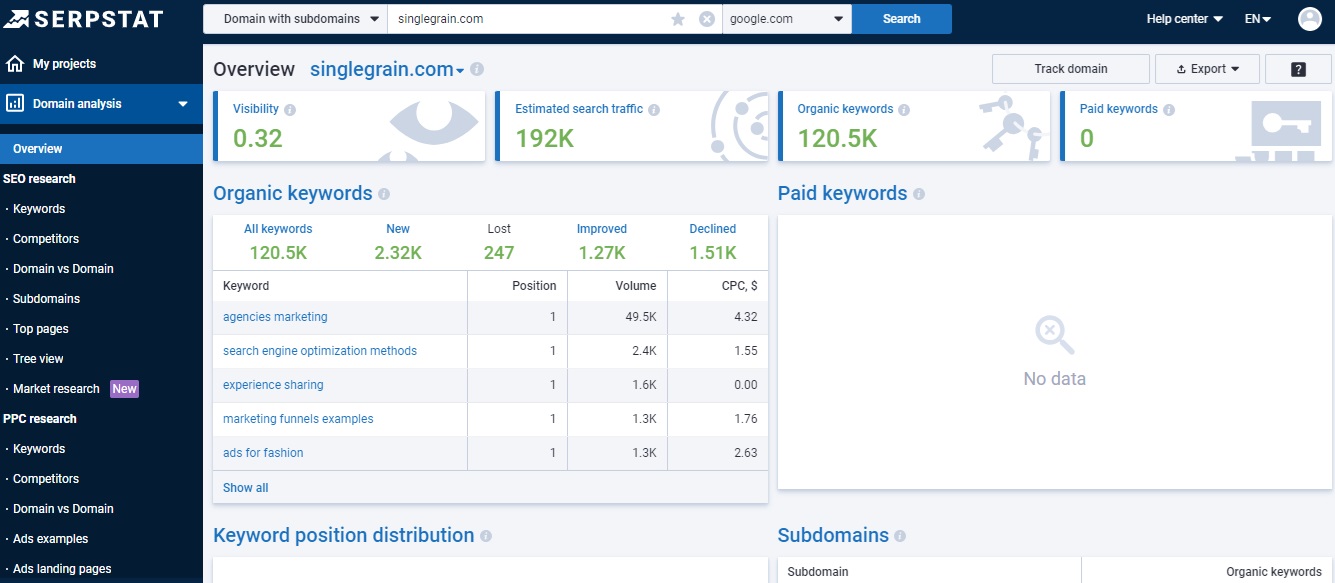
Top Features:
- Domain Analysis – Track organic keywords that you rank for, your search traffic, top-ranking pages and more.
- SEO Tasks Lists – Improve productivity and efficiency by using Task Lists to streamline and simplify your workflows.
- AI Content Tools – Quickly generate everything from titles and meta data to YouTube video transcriptions, FAQs, and other content elements.
Why It’s Useful
Serpstat’s freemium model is useful for small businesses and solo products as it allows you to run 10 keyword searches and audit up to 10 pages per day. The premium versions (from $45 per month per month) unlocks those restrictions, making this a decent option if you’re keeping a close eye on your budget.
10) Keywords Everywhere (Paid)
Keywords Everywhere is an SEO browser extension for Chrome, Firefox, and Edge. You can use it to examine all kinds of SEO and social media metrics as you browse.
How to Use This Tool
Simply install the extension in your browser and create an account.
You can then use Keywords Everywhere to get accurate, up-to-date statistics on rankings, traffic, and content.
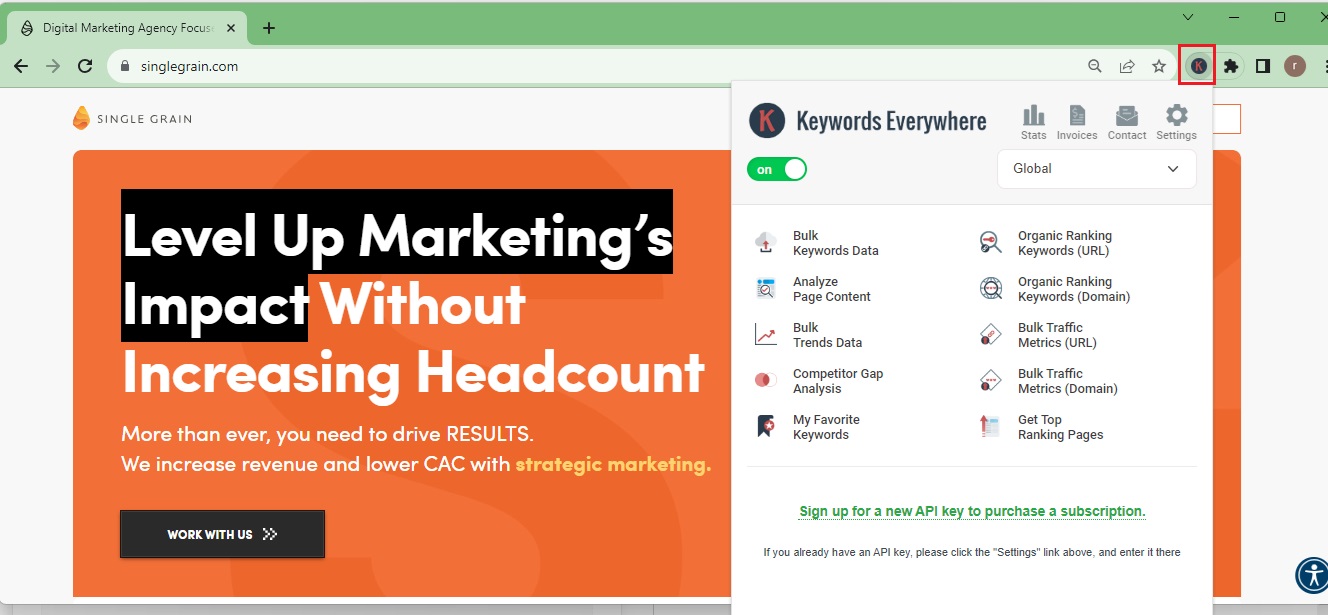
Top Features:
- Research Keywords – Find relevant keywords tailored to your business by analyzing search results.
- Social Media Metrics – Discover which social media content resonates best with your audience so that you can fine-tune for further success.
- Content Marketing – Access over 200 AI prompts to help you create quality content.
Why It’s Useful
Having SEO tools readily available in your web browser saves you the time and hassle of logging into a different platform every time you want to work on SEO, making Keywords Everywhere a very convenient tool.
11) ContentKing (Paid)
ContentKing is a real-time SEO auditing platform that keeps you up-to-date on your technical, on-page, and off-page SEO performance around the clock.
How to Use This Tool
Create an account and enter your domain name.
You can then access your dashboard to examine the health of your website, explore which pages are driving the most traffic to your site, and find technical issues that need addressing
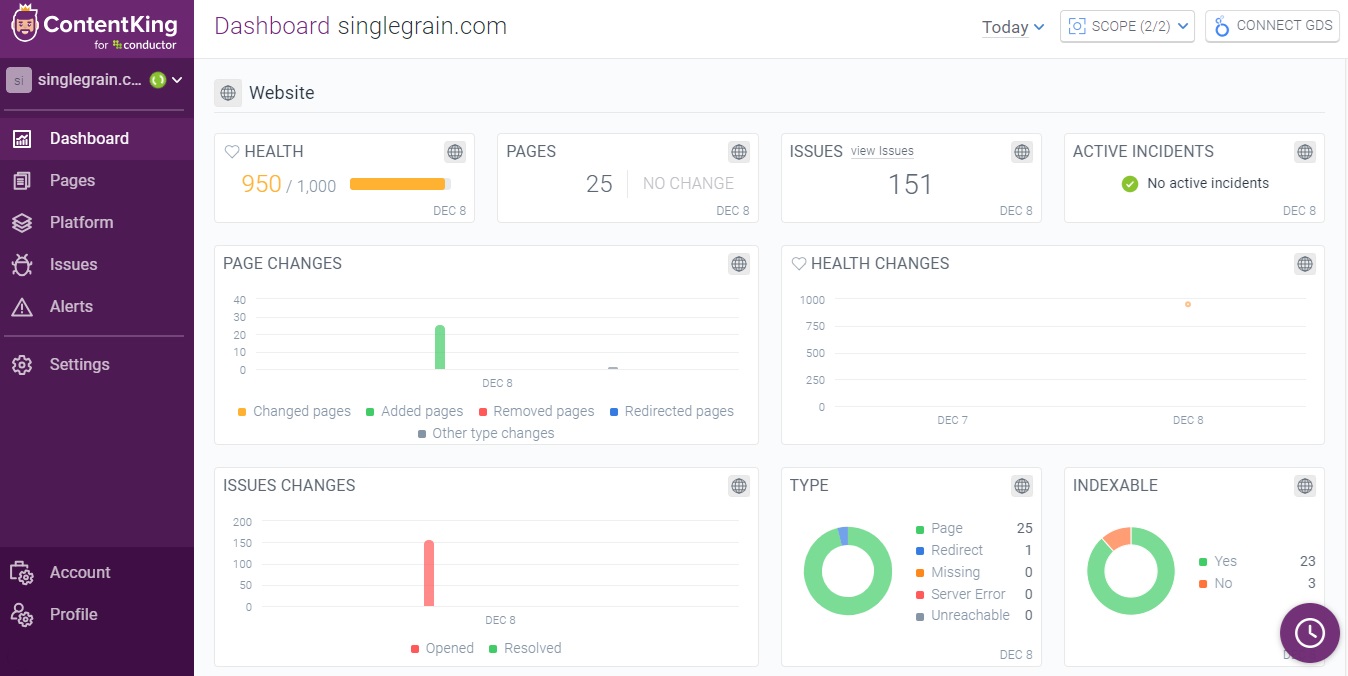
Top Features:
- Website Dashboard – See all data about your website in a well-organized visual dashboard before drilling down to examine key metrics.
- Make Improvements – Check that your sitemaps, robots.txt, and other technical elements are in place and optimized.
- Alerts – Set up notifications so that you’re alerted the moment an SEO issue arises with your site.
Why It’s Useful
Most SEO tools only provide monthly data, which isn’t always useful if you run a busy site with lots of fresh new content. ContentKing provides you with real-time data so that you can make informed decisions based on up-to-date metrics.
12) XML Sitemaps Generator (Freemium)
Sitemaps play an invaluable role in helping Google search crawlers understand your content and the relationships between your pages so that they can crawl and index your site more intelligently. If you don’t already have an XML sitemap on your site, the XML Sitemaps Generator is a quick and easy way to get one.
How to Use This Tool
Just enter the full URL of your website and the tool will start generating the sitemap:

Top Features:
- Effortless XML Sitemap Generation – Quickly create a valid site map without the need for any registration.
- Delivered to your inbox – Get a copy of your sitemap sent to your email The tool emails you the generated sitemap so that you can put it on your site at a later time.
Why It’s Useful
With the help of XML Sitemaps, you can create separate versions of HTML and XML sitemaps that is beneficial for both the user and the search engines.
Premium Version
You can create a sitemap for up to 500 pages in the free version. If you have a large site, then you need to purchase the premium version for $4.19 per month. This will let you create a sitemap for an unlimited number of pages.
13) SEO Site Checkup (Freemium)
SEO Site Checkup lets you instantly analyze SEO issues, understand your competitor’s SEO profile and generate reports that you can act upon.
How to Use This Tool
Simply enter the URL of your website and click on “Checkup”.

The tool will analyze the URL and provide a score out of 100. The greater the score, the better your website is in terms of SEO.

Top Features:
- On Page SEO Checker – Analyze on-page factors of your website, like meta tags and keyword usage.
- Performance Analysis – Check the page speed and security of your website to identify errors and areas for improvement.
- Mobile Design Check – Discover any issues affecting the mobile-friendliness of your web pages.
Why It’s Useful
Offering a fast and effective solution for checking issues with both on page and technical SEO, this tool also provides useful recommendations on how to fix any problem it finds.
Premium Version
The free plan allows up to five check-ups in one day, though you must create a free account in order to check more than one website each day. If you need to generate more than 300 reports per month for more than three websites, you’ll need to purchase a paid plan starting at $29.95 a month.
Dive Deeper: 10 Effective SEO Techniques to Drive Organic Traffic in 2024
14) SERPs Rank Checker (Freemium)
This handy rank tracking tool shows you how each of your pages are performing based on their keywords, so that you can make informed decisions to improve your content and SEO strategy, ultimately driving more organic traffic and conversions.
How to Use This Tool
Simply enter the your domain name and the SEO rank checker tool will get to work analyzing your SERP rankings.

When it’s done, you’ll get a break down of each keyword you rank for, it’s position in search results, and other valuable SEO data.

Top Features:
- Location Rank Checker – Easily track the ranking of your website on selected locations, saving you the time and trouble of checking them on Google and without the use of VPN.
- Rank Tracker – Monitor changes to your ranking positions in search engines over time.
- SEO Tool Kit – SERPS also provides other free SEO tools like SERPs also offers other free tools like Keyword Database and competitor analysis features.
Why It’s Useful
You can easily track the rankings of keywords without having to manually check them on Google.
Premium Version
With the free version, you can check just one keyword at a time. For more keywords you need to purchase the Premium version. Subscriptions run from $44 for 750 keywords to $191.20 for 5,000.
Dive Deeper: My Site’s DR Is 1.2 but My Article Ranks #1 in Google!
15) Siteliner (Freemium)
Duplicate content is the bane to your SEO success, so you need to check your website to see if there are any duplicate pages. This is where Siteliner comes in handy.
How to Use This Tool
Simply input your URL and click “Go.”

From there, you’ll see all the pages that have duplicate, common or unique content.

Top Features:
- In-Depth Duplicate Content Tools – Get a complete list of the pages on your site with duplicate content issues and the percentage of matching content on those pages.
- Broken Link Checker – Identify broken links on your site so that you can fix them
- Competitor Comparison – See how your web pages stack up against others in terms of page speed, words-per-page, and other useful metrics.
Premium Version
Siteliner operates on a pay-per-scan basis. Each scan of a page on your website will cost you a single credit, which are priced at $0.01 with a minimum order of 500 credits, making this a cost-effective way to run a comprehensive duplicate content audit.
16) Screaming Frog SEO Spider (Freemium)
Screaming Frog SEO Spider is a desktop SEO audit tool that does a top job of conducting comprehensive technical audits of any website.
How to Use This Tool
Once installed, click on the Screaming Frog icon on your desktop to open the tool, enter the URL you wish to crawl and click on start.

The tool will automatically crawl and fetch all the data related to the URLs for further review.
Top Features:
- Technical Site Audit Tool – Examine your entire site for server errors, broken links, duplicate pages, and other factors that may be negatively affecting your SEO performance.
- Metadata Analysis – Get useful suggestions on how to optimize your page titles and descriptions
Why It’s Useful
Screaming Frog is extremely useful in fetching a set of URLs and analyzing the important details like the meta tags or broken links. This tool saves a lot of time and helps to improve SEO.
Premium Version
With the free version, the tool has a crawl limit of 500 URLs. If you wish to analyze more than 500 URLs then you need to subscribe to the Premium version priced at $259 per year..
Dive Deeper: 4 Types of SEO Analysis & How to Do Them (Step-by-Step)
17) Semrush (Freemium)
One of the Semrush is one of the best SEO tools on the market, Semrush combines comprehensive SEO audit features with keyword research tools, competitor analysis, link building tools and more.
How to Use This Tool
After creating your account, Semrush runs a complete analysis of your entire site before presenting an overview of vital data relating to your traffic sources, backlinks, top-performing keywords and more.
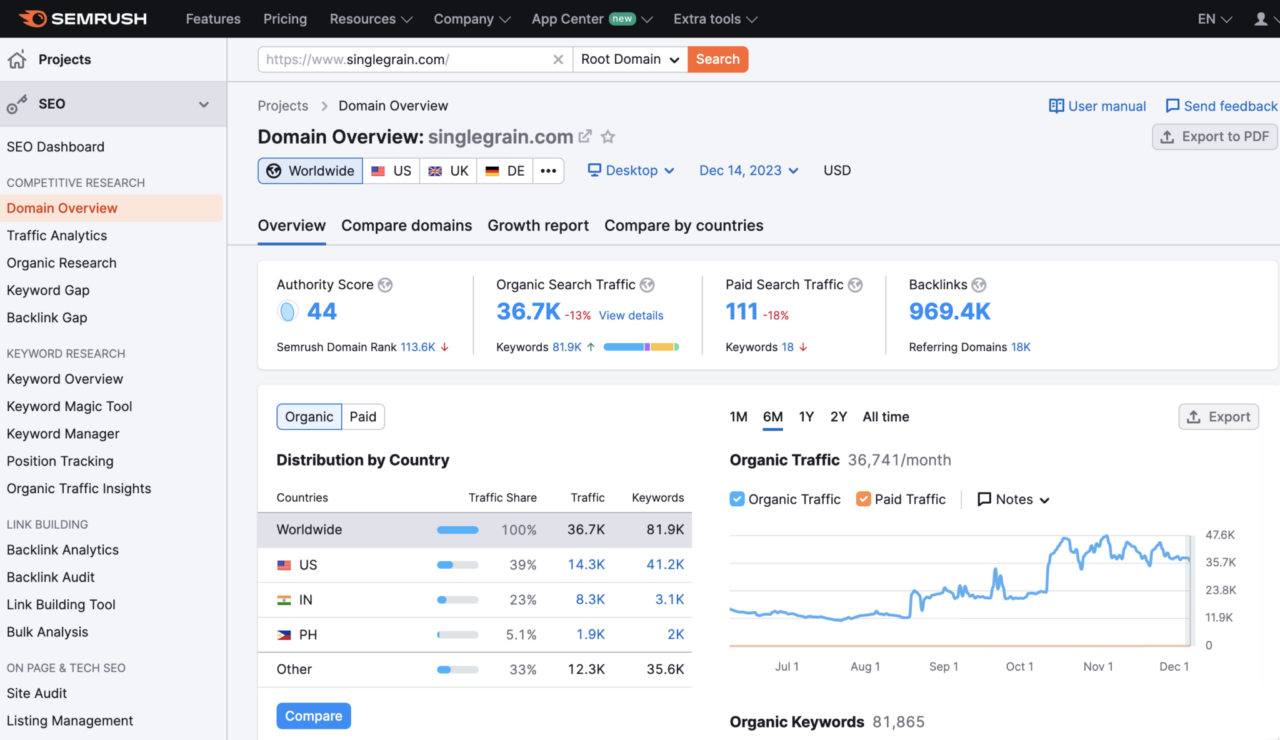
From there, you can drill down to analyze any data set in greater detail, or use other features such as the popular Keyword Magic Tool to research new keyword ideas for your site.
Top Features:
- Traffic Analysis – Get detailed statistics on your paid and organic traffic, including monthly search volume, Cost Per Click (CPC) value and more.
- Keyword Magic Tool – Use the in-built keyword research tool to find the best keywords for your campaign. You can conduct a Domain vs. Domain competitive analysis.
- Backlink Analysis – Dig deeper to analyze the links pointing to any domain.
- Content Analyzer – Measure the quality of content on your site and highlights the major issues in it.
Why It’s Useful
Semrush lets you look at each and every aspect of SEO right from keyword research to link building. If you want just one tool to get started, then Semrush should be your first choice.
Premium Version
The free version lets you conduct 10 searches per day. If you need more than that, then you will have to subscribe to the Premium version starting at $129.95 per month.
18) Keyword Tool (Freemium)
A solid alternative to Google Keyword Planner, Keyword Tool harnesses the power of Google’s autocomplete feature to recommend keywords most relevant to your niche.
How to Use This Tool
Enter your primary target keywords, choose whether to look at global keyword data or keywords relating to a specific country, then hit search.

The tool will return the best keywords to target based on your main keyword.
Top Features:
- 750+ Relevant Keywords – Get a high number of quality related keywords for every search.
- Location-Specific Search – Improve your local SEO by finding the most useful keywords relevant to a specific location.
- Advanced Filtering – Filter out negative keywords and sort by keyword suggestions or common questions that use your keyword.
Why It’s Useful
This tool is great when you’re looking for those very specific phrases that your audience is using to try and find you. It’s similar to doing an incognito Google search, but with more added value.
Premium Version
The free version of Keyword Tool only provides you with the full data for five full keywords. To access more, you can upgrade to a pro account from $69 per month.
Dive Deeper: SEO Keyword Research Made Easy in 2024
19) Moz Link Explorer (Freemium)
A tool created by Moz, Link Explorer is mainly a link analysis tool. It offers a comprehensive view of a website’s backlink profile and includes page link metrics such as domain authority, page authority and established links.
How to Use This Tool
Enter the URL that you want to research in the search box and this tool will provide a comprehensive analysis of the URL, including the domain, linking domains and anchor text.

Top Features:
- Detailed Link Data – Look at inbound and outbound links and see which percentage of your links are nofollow links.
- Competitor Analysis – Research your competitor links and compile them on the basis of DA and PA.
- Broken Link checker – Easily find and fix broken links to your site.
- Spam score – Check the spam score of links pointing to your site so that you can remove such links.
Why It’s Useful
Links are not going to die any time soon, meaning that the only effective way to make your site rank higher in the search results is by earning links. Moz Link Explorer lets you analyze your site’s link profile, compare it with your competitor’s link profile and then it provides link opportunities that you can use to defeat your main competitor in the organic search results.
Premium Version
With the free version of Link Explorer, you can research just 10 queries with 50 rows of data. For conducting a comprehensive research with unlimited queries, you need a Premium version starting at $99 a month.
Dive Deeper: 8 Ways to Use External Links to Improve Your SEO
Free SEO Tools
20) Google Search Console (Free)
Google Search Console is a must-have tool for every webmaster. It is a free tool that identifies issues on your site and measures your site traffic and performance.
How to Use This Tool
After creating an account and verifying your site, submit your XML sitemap and the tool will crawl all the pages on your site and start displaying suggestions to improve the domain visibility in Google.
Search Console lets you check search analytics like the site’s total impressions, clicks, average CTR, and ranking position on Google.

Google Search Console also helps you check your site’s Core Web Vitals issues for both desktop and mobile devices. You can check which pages have a poor score and which pages need improvement.

Top Features:
- Technical SEO Analysis – Find technical SEO errors like 404, redirection errors and mobile usability errors.
- Page Experience – See the number of good and bad URLs n your site
- Core Web Vitals – Identify pages that have page loading issues such as LCP, FCP or FID via the Core Web Vitals tools.
- SERP Performance – Monitor your site’s performance in the SERPs and find out how many impressions and clicks your site is getting on Google.
21) Google PageSpeed Insights (Free)
Google PageSpeed Insights is a free tool that checks the speed of your site and provides suggestions to improve it.
How to Use This Tool
Enter your site or blog’s URL, click the “analyze” button, and the tool will automatically check the speed and overall user experience of your site and provide a score – for both desktop and mobile UX.

Here’s how the scores rank:
- A score of 90+ means that your site is FASTER than most other sites.
- A score between 50-90 is considered AVERAGE.
- A score below 50 means that your site is SLOW.
You need to opt for a score above 90 to offer your users a better site experience and to increase your chances of ranking higher in the search results.
Top Features:
- Desktop and Mobile Speed Tests – Check your site speed on both mobile and desktop to ensure you deliver an optimum user experience on all devices.
- Performance Improvements – Get helpful recommendations and instructions on how to improve your site’s performance metrics.
Why It’s Useful
In July of 2018, Google announced a major update to its mobile ranking factors: page speed became a top ranking factor for mobile searches. So, Google PageSpeed Insights is useful because it helps you optimize your site for page speed which is important to avoid any penalties.
Dive Deeper: 10 Most Important Google Ranking Factors (& How to Optimize for Them!)
22) Netpeak Spider (Freemium)
Netpeak Spider is an SEO crawler for regular SEO auditing, quick issues search, system analysis, and website parsing. It’s a desktop tool that can be installed on both Mac and Windows OS.
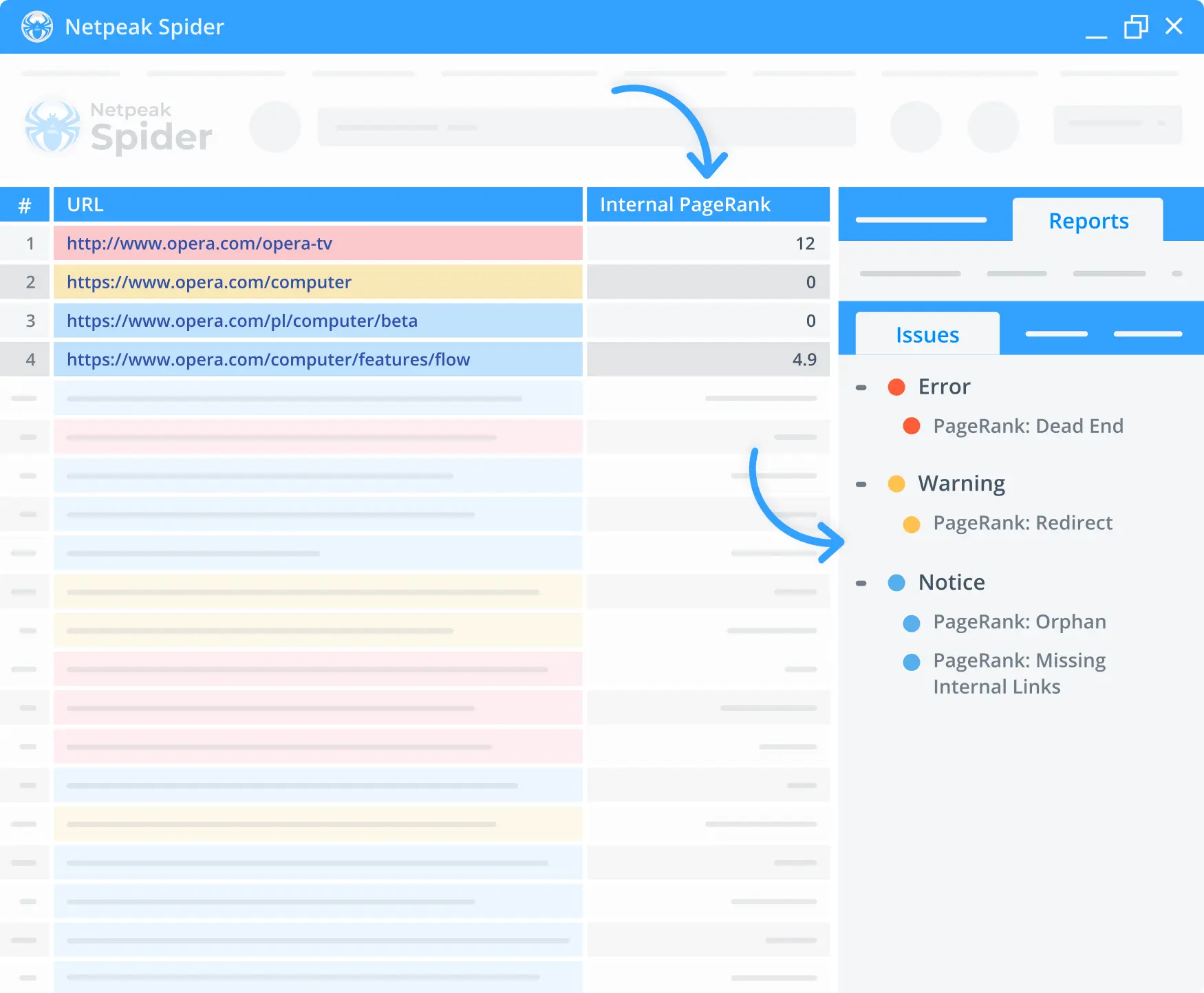
How to Use This Tool
You need to create a free account with Netpeak software and install the Netpeak spider on your computer or laptop. Once it is installed, click on the Netpeak spider icon on your desktop in order to open the software.
Once installed, you need to enter the URL to be analyzed in the “Add URL” bar. The crawler will start fetching the URLs and present the issues within minutes.
Top Features:
- Link Analysis – Analyze internal and external links, find broken links and redirects and more.
- Technical and On Page SEO Auditing – Quickly analyze titles, meta descriptions, H1 headers, full pages, etc.
- Scraping – Run a custom search and extraction of source code or text via four types of search: ‘Contains’, ‘RegExp’, ‘CSS selector’ or ‘XPath’.
Why It’s Useful
This tool works as a standalone desktop software and makes it easier for you to analyze URLs in a comprehensive manner. The tool checks 62 issues according to 52 parameters in the shortest possible time – a task that would be time consuming if performed manually.
Netpeak Spider is available for free with no limitations in terms of use, number of analyzed URLs or settings customization. Premium plans with additional features are available from $7 per month.
Dive Deeper: How to Perform an SEO Audit for Your Website
23) Schema Creator (Free)
Schemas provide users with an enhanced experience in which they are presented with specific details about a particular company or organization on the SERPs. With this tool, you can customize how your business looks in the SERPs, including your reviews, operating hours, events, etc.
How to Use This Tool
Select the type of markup you wish to create from the drop-down on the left side and enter the details related to your business.

The tool will automatically generate a JSON-LD schema data on the right side of the page. You can copy the code and paste it in the <HEAD> section of your HTML document.
Top Features:
- Effortless Integration – Simply copy and paste your structured data markup into your site
- Available as a WordPress SEO plugin – Making it easier to manage schema without leaving your website dashboard
- Structured Data Testing Tool – Check that your new schema markup is valid before using it.
Why It’s Useful
With the help of Schema creator, you can quickly generate the required schema data and add them to your important business pages. This will enable search engines to better understand the content in your web pages and will enable your pages to rank higher in the search results.
24) SEO Book’s Robots.txt Generator (Free)
SEO Book’s Robots.txt generator makes it easy to create the robots.txt file that commands the search crawlers which pages on your site should be crawled and which ones are to be left out.
How to Use This Tool
Choose the command (disallow or allow – by default every file is allowed) and enter the name of the file or directories.
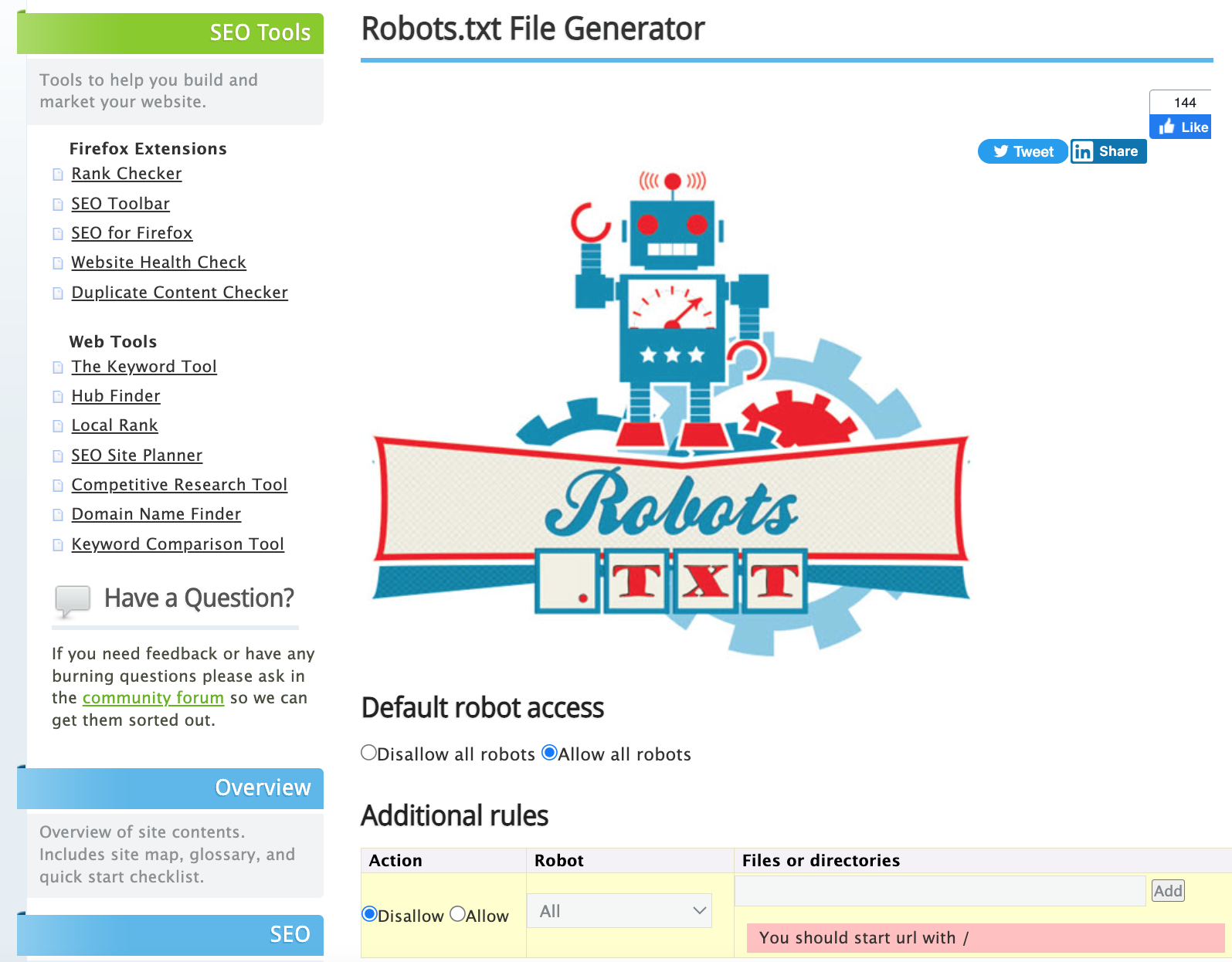
The code to be added in the robots.txt file will get displayed in the text right below the rules area.
Top Features:
- Allow/Disallow Rules: Easily disallow crawling of directories and files and instruct the robots how to crawl your site.
- Fast Acting – Generate the required text file in seconds.
Why It’s Useful
You definitely don’t want search bots to access confidential information related to your customers and make them public. This is where robots.txt file comes handy. The Robots.txt generator from SEO Book helps you to generate the required code in seconds so that you can add it to your site.
25) SEOquake (Free)
One of the best free SEO tools for on-the-fly SEO research, SEOquake is a browser extension that displays an SEO overview of any given page through a toolbar or SERP overlay.
How to Use This Tool
You need to install the SEOquake extension on your browser. Chrome, Mozilla, Safari and Opera are supported.

Once the extension is installed, you will see a toolbar in your browser. You can quickly run a complete SEO audit of any website using this tool.
Top Features:
- Valuable Website Data – Get an at-a-glance look at the total number of indexed pages, domain age, social shares and external links for any website. It displays the total number of indexed pages, domain age, social shares and external links.
- Real-Time Statistics – View real-time stats as you browse instead of running the site through an external tool, making your SEO research more efficient.
- On Page SEO Audit Tool – Check for any errors on your site and receive recommendations on how to fix them.
Why It’s Useful
SEOquake is pretty useful because you can conduct a complete SEO audit in a flash. This tool comes in handy when you are short on time and need to examine a lot of URLs fast.
Dive Deeper: 9 Quick SEO Tactics That Only Take 10 Minutes to Implement
26) Google Analytics (Free)
Google Analytics is a free SEO tool that serves as a mission-critical essential for anyone who takes their search optimization performance seriously.
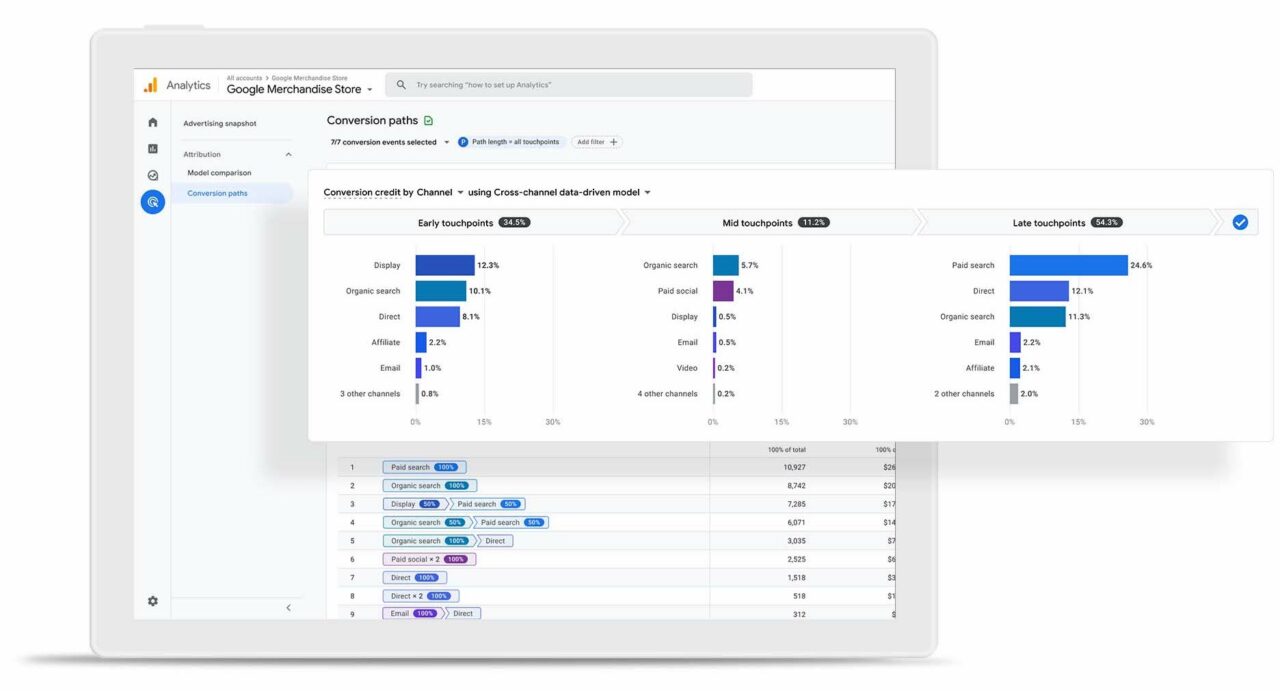
How to Use This Tool
Once you have added your website as a property, navigate to Tracking code under the property column and copy your tracking code. Paste this tracking code right after the <HEAD> tag on each page of your site.
Once this is done, you will be able to obtain valuable information related to your site when you login to Google Analytics.
You can see the number of visits to your site, the channels that are sending you the maximum visitors, time on page, bounce rate and other important metrics.
Top Features:
- Monitor and Measure Traffic – See how much traffic is coming into your site, and the ways in which people are getting there.
- Campaign Parameter Tracking – Easily find out which campaigns are generating the maximum traffic and conversions.
- Goal Tracking and Funnel Conversion Path – Find out how many users are converting and which path they are using for conversion.
- Audience Reports – Better understand your audience, like their age and the device they are using to reach your site.
Why It’s Useful
Google Analytics provides a lot of data that comes directly from Google. You can identify the total traffic to your site, the total conversions and the total revenue generated from your site. You can trust the data and take the required actions in order to further optimize your site.
27) Ahrefs Webmaster Tools (Free)
Webmaster Tools is the Ahrefs’ free alternative to their own SEO suite. Although it doesn’t provide as many tools as its paid counterpart, it’s still one of the best free SEO tools on the market.
How to Use This Tool
After creating a free account, you can import your site data from Google Search Console or manually add your site.

You can then use the site to analyze your backlink profile, explore useful keywords to target, and track your search rankings.
Top Features:
- Site Explorer – Get an in-depth look at your organic search traffic and referring domains.
- Paid Keywords Report – See which keywords your competitors are paying for so that you can determine which ones to include in your PPC strategy.
- Internal Link Auditing – Find broken and redirected pages and get key insights into the link juice passed between your pages.
Why It’s Useful
Ahrefs Webmaster Tools is incredibly useful for anyone who needs a complete SEO suite but lacks the budget to pay for the main Ahrefs product.
28) AnswerThePublic (Freemium)
AnswerThePublic is a search listening tool from Neil Patel that helps you find relevant long tail keywords to target.
How to Use This Tool
Open AnswerThePublic and enter a head term relating to your niche, brand, or products.
In return, you’ll be presented with a unique visual interface listing all of the most searched for questions related to your target keyword, as well as popular variations on your head term with different modifiers.

Top Features:
- Data Visualization – Easily examine a huge variety of keywords in a graph format, making it easy to pick out ones to target.
- Location-Based Keyword Targeting – Search for keywords by country so that you can better optimize your content for local and international search.
Why It’s Useful
AnswerThePublic offers three free searches per day, making it useful for bloggers and solopreneurs who don’t need huge amounts of keyword data at any single time.
29) MozBar (Free)
MozBar is one of the best free SEO tools for on-the-go research and analysis.
How to Use This Tool
Add the MozBar extension to your browser and you’ll get a domain overview for any website you visit:
Top Features:
- Domain Metrics – Examine the Page Authority, Domain Authority and spam score of any page on the web.
- Page Optimization – Get useful suggestions on how to improve a page’s ranking for a particular keyword.
- Page Analysis – Quickly check that all your SEO elements like page titles, descriptions, and schema markup are in place.
Why It’s Useful
MozBar isn’t the only on-the-fly SEO tool available, but it is one of the fastest and easiest to use, while the page optimization features are incredibly helpful for carrying out content audits.
30) Google Trends (Free)
Google Trends provides real-time insights into popular search terms, helping you to capitalize on trending topics within your niche.
How to Use This Tool
Open Google Trends in your browser and enter a search term.

The platform will then show you a breakdown of search interest in that keyword over the past 24 hours, along with the most popular related keywords.
Top Features:
- Interest Over Time – Evaluate audience’s interest in any given topic, with data updated almost every ten minutes.
- Trending Now – See the most searched for topics across all industries.
Why It’s Useful
Google Trends is one of the best free SEO tools for bloggers, news sites, and content creators looking to stay ahead of the curve. By analyzing the popularity of different subjects and brands, you can have a better chance of creating content that’s going to resonate with audience interests at any given moment
31) Google Lighthouse (Free)
Google Lighthouse is a free site audit tool for developers that combines the company’s Mobile-Friendly Test with other useful tools for managing performance, accessibility and SEO, as well as best practices and progressive web app (PWA) metrics.
How to Use This Tool
Once you’ve downloaded this extension, using Google Chrome, right-click on the page you want to audit and click Inspect to open Chrome DevTools.

Navigate to Lighthouse and select which categories you want to audit: Performance, Accessibility, Best Practices, SEO, and Progressive Web App. Then click Analyze Page Load to get a breakdown of any technical issues affecting that page, along with instructions on how to fix them.
For more accurate results, consider running Lighthouse in an incognito window to avoid interference from browser extensions. Also, you can toggle between mobile and desktop audits to see how your site performs on different devices.
Top Features:
- Diagnostics – Identify errors and areas for improvement in the technical set-up of your website.
- Best Practices – See how well you’re doing at adhering to the best practices recommended by Google.
Why It’s Useful
Last Word on SEO Tools
These are just thirty-one of the most important tools that an SEO must use. You can start with the free versions of the freemium tools to determine if these are the right tools for your conversion goals, and if one or more work well for you, you always have the option to upgrade to a paid plan.
You are sure to find a tool that fits your needs and budget, and once you find one that works well, stick with it. Whichever tool and plan you choose, make sure that you are maximizing all the value you can possibly get from it.
Implementation and experimentation are perhaps the most important aspects of search engine optimization – but all the results and recommendations in the world are useless if you don’t follow through and execute.
If you you need help driving measurable increases in your organic traffic, Single Grain’s SEO experts can help!👇
Additional content contributed by David Borgogni.
SEO Tools FAQs
-
What are SEO tools?
SEO tools are software applications designed to assist in optimizing websites for search engines. They provide insights into website performance, keyword rankings, backlink profiles, and competitor analysis. Common examples include Google Analytics, Google Keyword Planner, and Bing Webmaster Tools. These tools help in understanding how a website appears to search engines and suggest improvements.
-
Are SEO tools necessary?
Yes, SEO tools are necessary for effective search engine optimization. They offer valuable data and insights about website performance, keyword effectiveness, and competition. Tools like Google Analytics and Bing Webmaster help in making data-driven decisions to improve search engine rankings.
-
Is it worth paying for SEO?
Paying for SEO can be worth it as it often leads to better visibility, higher traffic, and potential revenue increases. While free tools like Google Trends and free keyword tools for research offer basic functionalities, paid tools often provide more comprehensive features and detailed insights.
-
Is SEO still worth it in 2024?
Yes, SEO is still worth it in 2024. The digital landscape continues to evolve, and maintaining a strong SEO strategy ensures that your website remains visible and relevant on search engines and other platforms.
-
How accurate are SEO tools?
SEO tools, including those from Google and other search engines, are generally accurate but not infallible. They provide estimations and trends based on available data. However, discrepancies can occur due to the dynamic nature of search engine algorithms and internet behavior.
-
What is the best SEO tool to use?
The best SEO tool depends on your specific needs and goals. Google Analytics is excellent for traffic analysis, Google’s Keyword Planner is ideal for research, and Bing Webmaster Tools offers insights specific to Bing’s search engine. Researching various options, including free and paid tools, is advisable to find the best fit.
-
Can I do SEO for free?
Yes, you can do SEO for free using various free tools and resources. Google Keyword Planner, Bing Webmaster Tools, and Google Trends are free and provide valuable insights for optimizing your website. Additionally, applying basic SEO strategies such as keyword optimization and quality content creation does not require payment.
-
What is the number one SEO tool?
While there’s no definitive “number one” SEO tool as it varies based on individual needs, Google Analytics is widely recognized for its comprehensive data tracking and analysis capabilities. It provides deep insights into website traffic, user behavior, and conversion metrics, making it a popular choice among SEO professionals.


